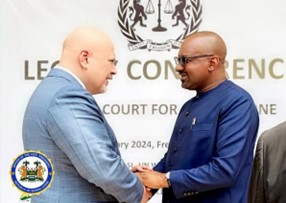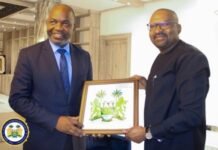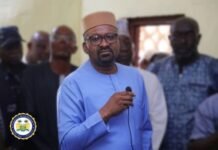By Amin Kef (Ranger)
The Residual Special Court for Sierra Leone, with support from its partners, has concluded a two-day Legacy Conference, which started on Monday 26th February and ended on Tuesday, 27th February, 2024 at the Bintumani Conference Centre in Freetown.
Participants of the epoch making event included eminent personalities from the legal landscape, representatives of Civil Society Organizations, international experts from various continents, United Nations Officials, University Professors , officials of various Non-Governmental Organizations, victims of the 11 years war in Sierra Leone and community leaders.
The Conference was called to order by the Registrar of the Residual Special Court for Sierra Leone, Ms Binta Mansaray, who succinctly highlighted and briefly delved into the theme: “To Raise Awareness of the Contributions of the Special Court for Sierra Leone to International Justice, Peace and Security”. She further underscored that the other key objectives of the conference are to reflect on the past and identify significant milestones or achievements made by the Special Court also stressing that the key expectation is to consolidate peace and social cohesion.
Vice President of the Residual Special Court, Justice Emmanuel Ekundayo Roberts, in a statement delivered in respect of the President, Justice Pierre G. Boutet, who was unavoidably absent but was closely following the various sessions, highlighted that after 22 years since the establishment of the Special Court for Sierra Leone, which was the first hybrid tribunal, convening a conference of such a nature was not only timely but also important considering the challenges to international justice and democracies around the world . Justice Roberts noted how the need for justice and accountability to fight impunity and promote peace cannot be overlooked. He informed that the conference will disclose lessons learnt and their application to emergent as well as ongoing transitional justice efforts not only in West Africa but globally. The Vice President added that it is another milestone event that is meant to promote the legacy of the Special Court which he said successfully completed its mandate within record time.
He said the successor body of the Special Court, the Residual Special Court preserving the legacy of the court in various ways and went on to mention specific legacies ranging from its immense contributions to international jurisprudence and to serving as a reminder to individuals that perpetration of impunity cannot go unpunished.
Justice Ekertarina Trendafilova, President of Kosovo Specialist Chambers and Specialist Prosecutor’s Office, on her part, said it is a privilege to reflect on the legacies of the Special Court which, according to her, materialized due to a collective resolve to fight impunity. She pointed out that an important legacy that the court left in its wake was the huge contribution to international justice adding how the court provided a record of what truly transpired, also informing participants that one of its overall successes was sending a strong warning to future generations to refrain from violations of international criminal law.
She continued that the court gave the victims of the war a voice and helped in reducing their harrowing experiences by holding perpetrators accountable. Among other legacies she mentioned the vast contributions to jurisprudence, changing the perception of the immunity of Heads of State vis-à-vis against being held accountable for committing heinous crimes making reference to the trial and judgement of former President of Liberia, Charles Taylor. She stressed how it really helped in changing the notion of the sovereignty of a State as a barrier to preclude perpetrators of impunity and violation of international law and human rights from accountability or bearing the greatest responsibility of conflicts.
Justice Ekertarina Trendafilova mentioned another significant legacy of mainstreaming gender based issues in the dispensation of justice referencing forced marriage, rape and the use of child soldiers as precedents in adjudicating cases involving impunity and gross human rights violations elsewhere in the world.
In his statement, the Prosecutor of the International Criminal Court (ICC), Karim A.A. Khan, praised the hospitality of Sierra Leoneans saying it is one reason for the success of the Special Court for Sierra Leone. He expressed excitement to be part of what he referred to as a significant conference adding that the establishment of the Special Court was a critical accomplishment by the United Nations and further maintained how it portrayed that justice belongs to Sierra Leone.
Karim Khan underscored that the rule of law was seen as something that was not alien or externally imported but was rather demanded by Sierra Leoneans stressing the importance of homegrown justice. He pointed out that the vital roles played by the court to international justice and peace cannot be forgotten easily. According to him, the court helped in bringing forward many outstanding Sierra Leoneans who are today contributing immensely to the furtherance of justice here at home and abroad.
He said the legacies of the court should galvanize the next generation and position them to continue to raise the bar high. The Prosecutor said one key legacy of the court was that there was no one that came forward with complaint of miscarriage of justice and highlighted the pivotal role it played in the ICC in enriching its processes. Karim Khan ended up saying essential principles of justice cannot be compromised.
The Assistant Secretary General of the United Nations Office of Legal Affairs, Stephen Mathias, in his keynote address gave a historical background that led to the establishment of the Special Court. He said these are not easy times for international peace and security as calls are becoming louder for impunity not to prevail. According to him, the creation of the Special Court for Sierra Leone is a testimony that impunity cannot be tolerated stressing how through the collaboration of the UN and Sierra Leone it became the first hybrid court to be instituted. He said the Court was an overall strategy for long term peace with the Government and people of the country occupying the driver’s seat. Stephen Mathias said there never existed a hybrid tribunal prior to the setting up of the court to try persons bearing the highest responsibility for war. He informed that after 22 years it is seen as a novelty and a significant move further highlighting the legacies of the court with particular reference of mainstreaming gender issues such as forced marriage into its proceedings as well as the issue of conscripting child soldiers.
Mentioning the localized nature of the Special Court, located in the country where the crimes were committed, he said it was advantageous for the country in various ways. He commended the roles played by Civil Society in the successful outcomes of the court stressing the importance of the Residual Court in preserving the legacies . The Assistant Secretary General ended up calling for more support for the Residual Court.
On his part, the Vice President, Dr. Mohamed Juldeh Jalloh, said all are gathered to commemorate an important milestone in the nation’s history, the twenty two years anniversary of the Special Court for Sierra Leone. He said the Special Court is a remarkable institution that played a pivotal role in the actualization of justice, reconciliation and peace after more than a decade long war in Sierra Leone. The Vice President informed that though the war brought immense suffering the establishment of the Special Court demonstrated the unwavering commitment to uphold the rule of law and ensured that justice was served. He said the trials that took place sent a strong message that impunity is unacceptable and went on to acknowledge the significant roles played by the Truth and Reconciliation Commission (TRC) in fostering national healing , truth telling side by side with the provision of justice by the Special Court.
According to him, important national institutions were instituted out of the TRC’s recommendations naming the Anti Corruption Commission, the Human Rights Commission and the Legal Aid Board underscoring the vital roles they are playing today.
Highlighting some of the court’s legacies he mentioned how it helped in shaping legal processes, investigations, the setting up of a Witness Protection Office, its impactful contribution to human capital development stressing how personnel who worked at the court acquired knowledge which is now applied in other sectors, mentioned former personnel of the court now working in key institutions abroad, helping in the grooming of professional law enforcement personnel engrossed in peace keeping missions overseas as well as how it helped in strengthening the country’s domestic judicial system.
The Vice President revealed how the Criminal Procedure Act is being revised that will contain important international instruments geared towards fair trial and judgement. He said Sierra Leone, now being a member of the UN Security Council, is a testimony of an impressive journey from a country that was once a recipient of decisions made by the UN for the restoration of peace to one that is now part of the decision making processes of brokering peace elsewhere. He ended up calling on all to renew the commitment of upholding accountability and the rule of law adding that the Government has plans to transform the former Special Court into a Justice Sector Complex that will host all legal entities in the country. He reiterated the importance of rising above partisan divide to actively promote national cohesion which, he said, is pivotal for a stable democracy.
Other key personalities included Valnora Edwin, representing the Civil Society, the Chief Justice Browne Mark, the British High Commissioner, in her capacity as Dean of the Consular Corp made salient contributions bordering on the Court’s legacies.
The two day conference also featured highly informative and thought provoking Panel Discussions by eminent personalities drawn from Sierra Leone and the international arena on thematic issues and subjects related to transitional justice and the legacies of the Special Court as well as the important functions of the Residual Court.
Closing remarks were delivered by the Attorney General and Minister of Justice, Mohamed Lamin Tarawally after the presentation of the Conference Outcomes.




